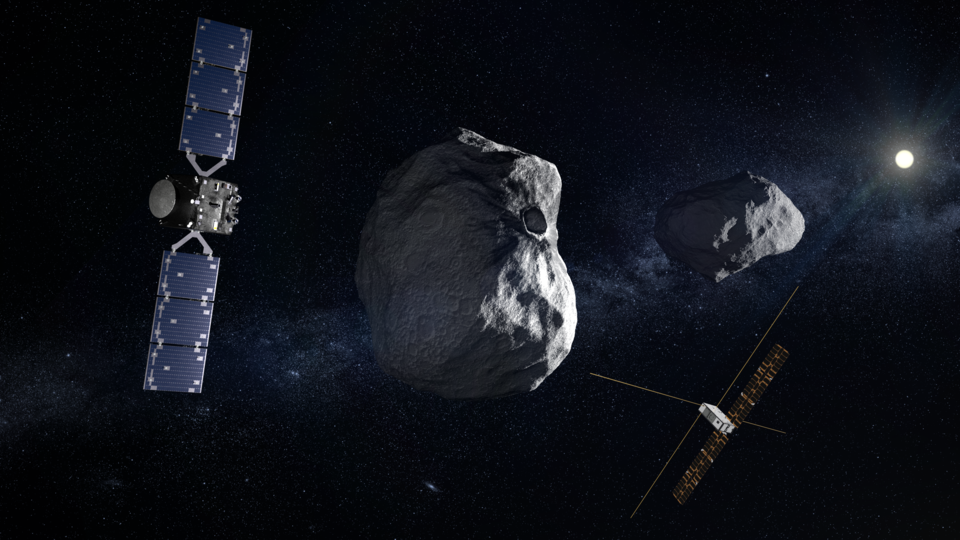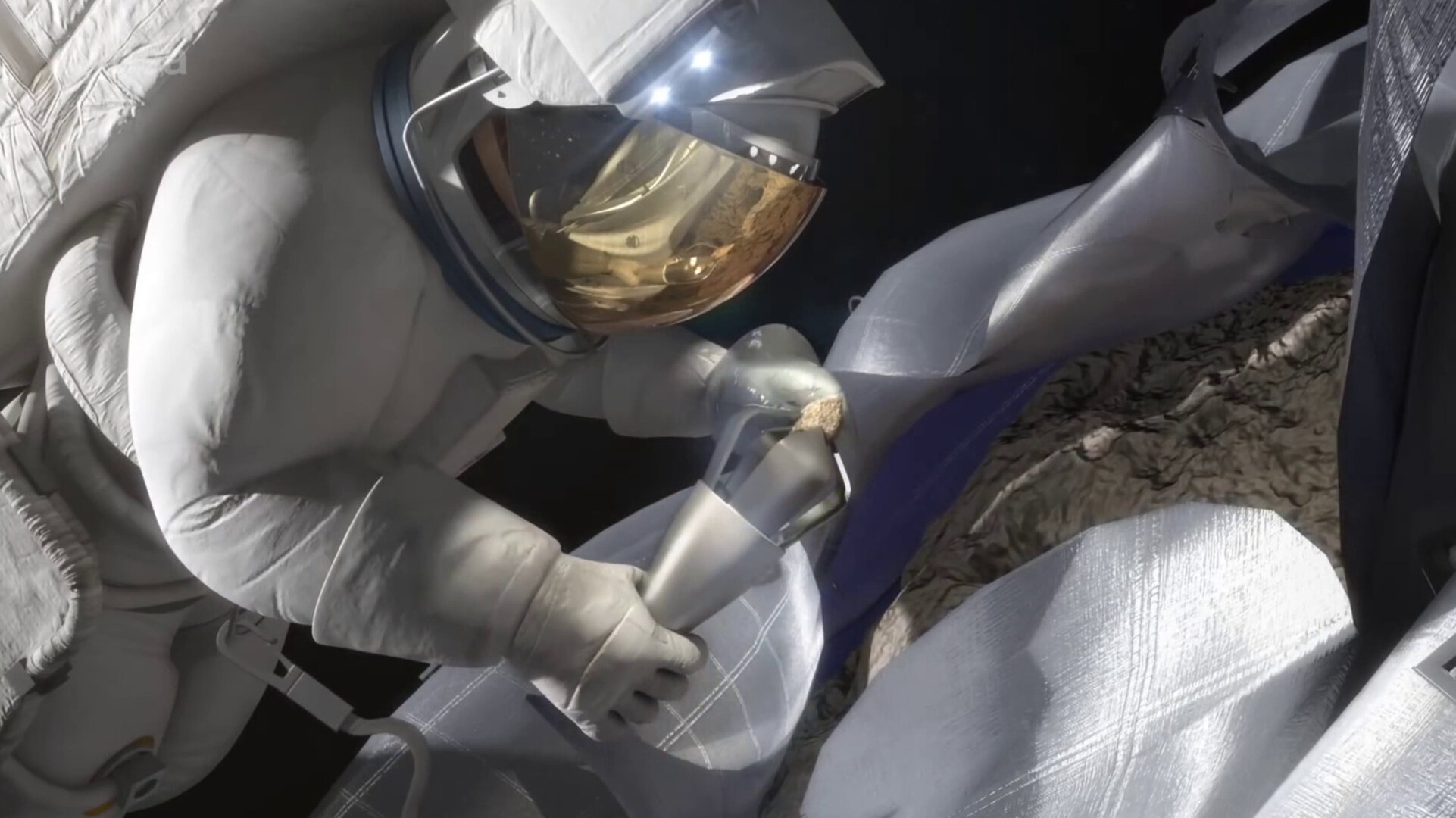Imagine walking on Hera’s asteroid
The team working on ESA’s Hera asteroid mission has glimpsed its destination. Last September NASA’s DART mission returned images of the boulder-strewn Dimorphos moonlet just before impacting it, in an audacious and ultimately successful attempt to shift its orbit around its parent asteroid Didymos.
Following on from DART, Hera will carry with it a pair of shoebox-sized ‘CubeSats’ that conclude their own observations by landing on Dimorphos. Team members have been using DART images to help visualise this process of touchdown. And in the process they can't help but imagine: what would it be like for human explorers to one day follow in these CubeSats’ footsteps?

Rocky horror
“The boulders covering the surface of Dimorphos are much bigger than they might look,” says planetary scientist Naomi Murdoch of ISAE-Supaero in France, working on the CubeSat landings. “At around 5-7 m across, the largest ones are typically house-sized.”
This assemblage of outsize rocks is a possible clue to the formation of Dimorphos. Its parent asteroid Didymos might well have spun sufficiently fast at some point in its past that material was flung off to collect in orbit. Supporting this theory, Didymos is shaped like a spinning top, with portions of its surface appearing swept clear of boulders.

Naomi explains: “Moving across these boulders would likely involve much more climbing and jumping than walking. Be careful though - jump too fast and you might never come down again, because you could exceed the local escape velocity. Plus in the ultra-low gravity environment it would be easy to generate significant ground motion, potentially triggering an avalanche of rocks.”
Sink or shoot
Patrick Michel, Director of de Research at Observatoire de la Côte d'Azur and Hera’s Principal Investigator adds: “A lot depends on whether its material is hard or soft, which would determine how high an astronaut might bounce, or else sink. On the asteroid Bennu, visited by NASA’s OSIRIS-REx, you would clearly sink if you landed too hard. On a harder body just 6 cm per second of upward motion might be enough to send you into orbit.”

Dimorphos, at 160 m across is about the same size as the Great Pyramid of Giza, orbiting around the mountain sized Didymos asteroid, about 780-m across. DART’s impact with the Dimorphos asteroid shifted its orbit around Didymos as well as casting debris thousands of kilometres across space. The current estimate is that about 1 000 tonnes of debris were blasted away, enough to fill 60 train carriages. Next, in October 2024, ESA’s Hera mission will begin its own journey to Dimorphos, to gather close-up data including the size of the impact crater and the asteroid’s mineral make-up and mass.
Hera will also deploy two '6-unit' CubeSats for additional observations: Juventas will perform the first radar probe of an asteroid’s interior while Milani will carry out mineral prospecting with its hyperspectral imager. Both CubeSats are also equipped with instruments to gather surface data once they land: Juventas has a gravimeter to make gravity field measurements while both Juventas and Milani have accelerometers to acquire details of their likely initial bounces, to reconstruct surface characteristics.

Designing for ultra-low gravity
The CubeSat deployment has been designed around the fundamental fact that Dimorphos’s gravity levels are less than a millionth of Earth’s. So the pair will be released from Hera at a velocity of just a few centimetres per second – any faster and they would risk escaping the asteroid’s feeble gravity and being lost in space. The MINERVA lander of Japan’s Hayabusa mission was lost in a similar manner when it was deployed in the wrong direction, as it attempted to land on the Itokawa asteroid in 2005.
Accordingly, any human astronaut would probably either use spikes and crampons to anchor themselves onto the surface, or else a thruster unit to glide over the surface – like a scuba diver exploring a coral reef.

“You would want to avoid contact with surface rocks while gliding however, as they are likely to be sharp enough to snag your spacesuit, having never been smoothed by water or wind,” says Naomi. “Adding to the challenge, your weight would shift by about 10-20% depending on where you are on the surface, because of tidal forces from the Didymos parent asteroid.”
Navigation would present another difficulty, comments Patrick: “It is likely Dimorphos was tidally locked before DART’s impact, but is now probably either rotating or ‘librating’ – wobbling – as it orbits Didymos.” Either way, this means the local sky above an exploring astronaut would probably be shifting all the time, and disorientation might become a risk.

Short but useful surface lifetime
Hera’s CubeSats will first carry out their primary missions – steering around Dimorphos using cold gas thrusters – before touching down on the asteroid. Juventas’s gravimeter has been designed to operate on the surface independently of its orientation on landing: assuming for instance it falls upside down, or between boulders, it will go on working for the approximately 20-hour lifetime of its battery. Milani’s accelerometers will record the force of its bounces as it comes down to the surface, gathering further data on the weak gravity field of Dimorphos. Results from both CubeSats will be gathered by Hera via its inter-satellite links.
Hera is due to be launched in October 2024, to arrive at Didymos and Dimorphos just over two years later.


Access the video
Today is Asteroid Day! Find out more about the fascinating asteroids populating our Solar System, the space missions seeking to explore them and the ways Earth is being safeguarded from impact threats in today's webcast for this annual UN-sanctioned global awareness campaign.














 Germany
Germany
 Austria
Austria
 Belgium
Belgium
 Denmark
Denmark
 Spain
Spain
 Estonia
Estonia
 Finland
Finland
 France
France
 Greece
Greece
 Hungary
Hungary
 Ireland
Ireland
 Italy
Italy
 Luxembourg
Luxembourg
 Norway
Norway
 The Netherlands
The Netherlands
 Poland
Poland
 Portugal
Portugal
 Czechia
Czechia
 Romania
Romania
 United Kingdom
United Kingdom
 Slovenia
Slovenia
 Sweden
Sweden
 Switzerland
Switzerland

























